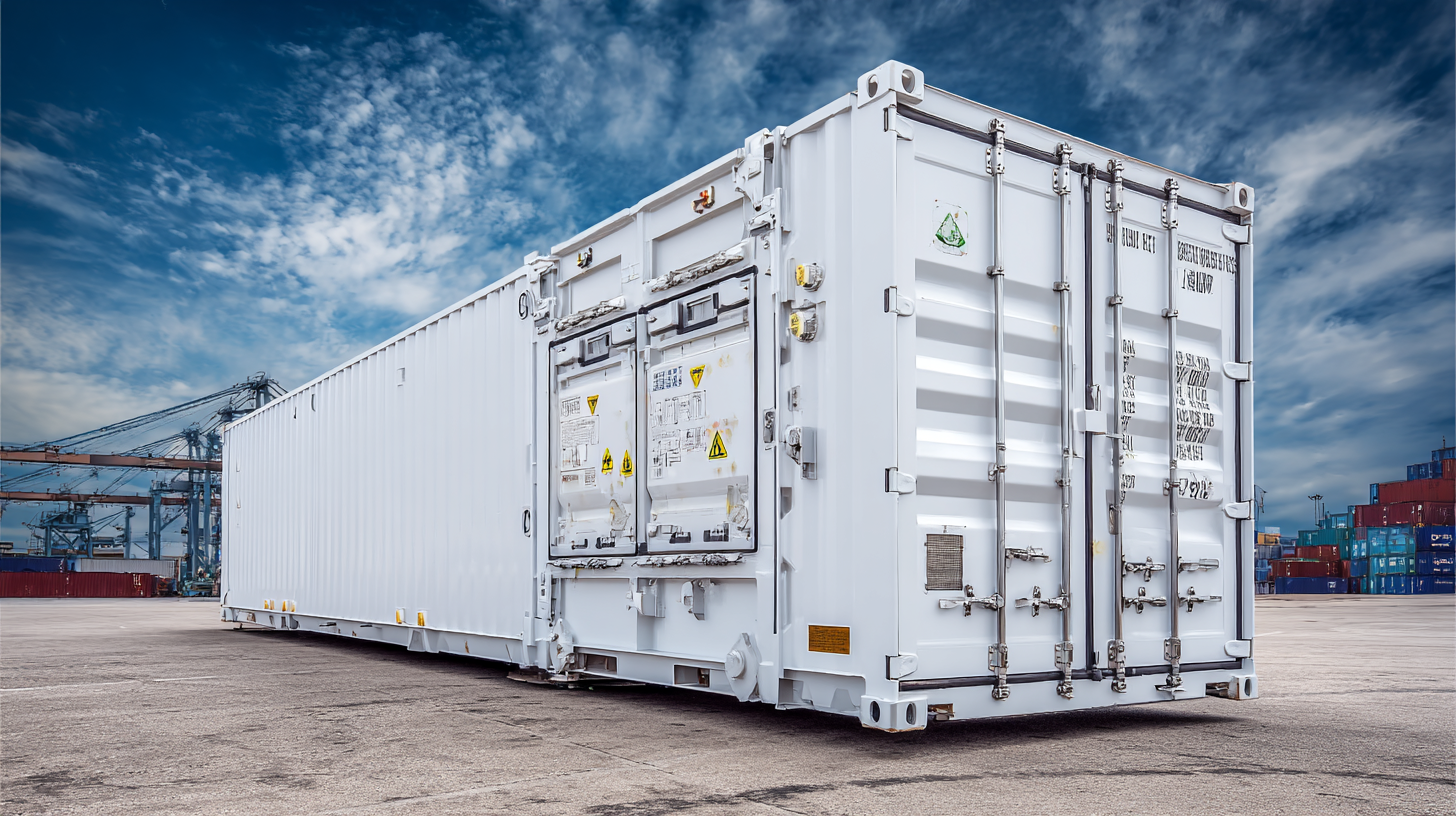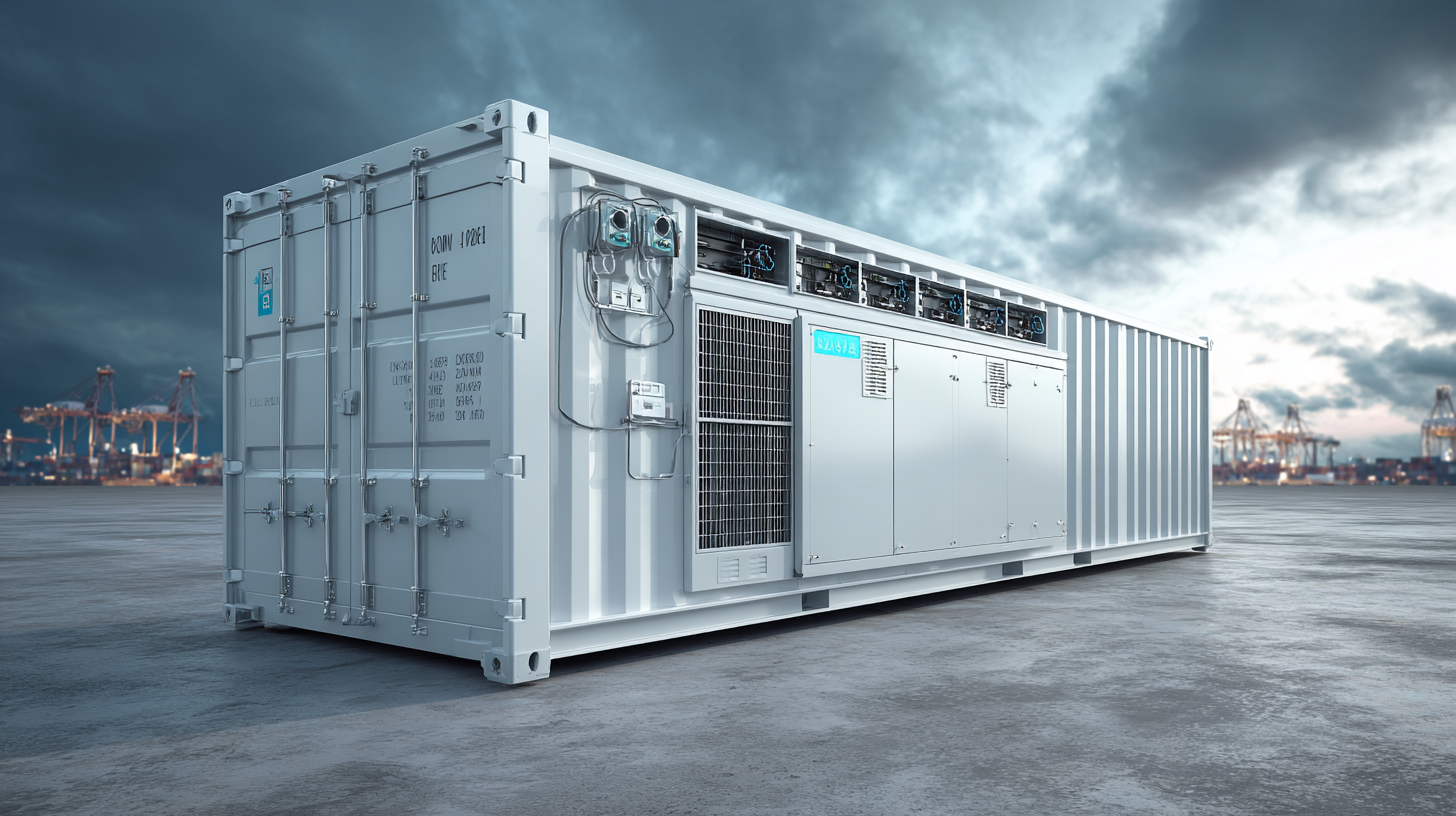Revolutionizing Shipping: The Future of Refrigerated Containers in Cold Chain Logistics
The logistics industry is on the brink of a transformation, particularly in the realm of cold chain logistics, where the demand for efficient and reliable shipping solutions is surging. According to a report by Allied Market Research, the global refrigerated container market is projected to reach $8.8 billion by 2025, driven by the increasing need for safe transportation of perishable goods such as food and pharmaceuticals. The introduction of advanced refrigerated containers is poised to redefine standards in temperature-controlled shipping, ensuring that products maintain their integrity throughout the supply chain. As businesses strive for sustainability and cost-effectiveness, leveraging innovative technologies in refrigerated containers will be crucial for optimizing logistics operations. This article explores the dynamic advancements in refrigerated containers and their vital role in shaping the future of cold chain logistics.

The Importance of Refrigerated Containers in Global Cold Chain Logistics
The significance of refrigerated containers in global cold chain logistics cannot be overstated.
These specialized containers are essential for transporting perishable goods, such as pharmaceuticals, fruits, vegetables, and seafood, across long distances while maintaining strict temperature controls. With increasing global demand for fresh and safe products, refrigerated containers ensure that supply chains remain uninterrupted, minimizing spoilage and waste.
Moreover, advancements in technology are enhancing the capabilities of refrigerated containers. Innovations such as IoT monitoring systems allow real-time tracking of temperature and humidity levels, ensuring optimal conditions throughout the journey. This reliability not only safeguards the integrity of sensitive cargo but also increases consumer confidence in food safety and quality.
As global trade continues to expand, the role of refrigerated containers in maintaining the cold chain will be pivotal in supporting efficient logistics operations and meeting the evolving needs of the market.
Key Trends in the Growth of the Refrigerated Container Market
The refrigerated container market is set to witness remarkable growth, with projections indicating an increase from $28.14 billion in 2024 to $64.49 billion by 2032, representing a compound annual growth rate (CAGR) of 11.09%. This growth can be attributed to the rising demand for efficient cold chain logistics, particularly in the transportation of perishables, which includes fresh produce and pharmaceuticals. With the recent announcement of the "14th Five-Year Plan" for cold chain logistics in China, there is a strong governmental support for the expansion and enhancement of refrigerated logistics systems.
One notable trend is the decreasing relevance of traditional refrigerated ships, which are losing market share in favor of container ships. The volume of seafreighted perishables has seen significant growth, with fresh product shipments increasing by 5% to 116 million tons, while refrigerated container shipping has surged by 8%. This shift indicates a robust market for refrigerated containers, aligning with the industry's push towards greener, low-carbon solutions in logistics.
Tips: Emphasize the importance of staying updated with the latest technologies in cold chain logistics to improve efficiency. Regularly assess supply chain strategies to adapt to the fast-evolving market conditions and consumer demands. Consider investing in modern refrigerated containers that not only optimize temperature control but also reduce environmental impact.

Technological Innovations Enhancing Refrigeration Efficiency in Shipping
The evolution of refrigerated containers is significantly reshaping cold chain logistics, driven largely by technological innovations that enhance refrigeration efficiency. According to a report by Allied Market Research, the global refrigerated transport market is projected to reach $19.49 billion by 2027, growing at a CAGR of 6.9% from 2020. Innovations in insulation materials and energy-efficient cooling systems have played a pivotal role in this growth, allowing for not only longer shipment durations but also substantial cost reductions associated with energy use. For instance, the use of phase change materials (PCMs) significantly improves temperature maintenance, reducing energy consumption by up to 30% compared to traditional methods.
Moreover, the integration of IoT technologies has transformed the management of refrigerated containers, making them more responsive and adaptable. This digital transformation allows for real-time tracking and monitoring of temperature and humidity levels during transit, ensuring perishable goods maintain their quality. According to Gartner, by 2025, it is estimated that up to 75% of refrigerated containers will be equipped with IoT sensors, enhancing visibility and traceability throughout the supply chain. As these technologies gain traction, the industry is poised to further improve operational efficiencies and reduce spoilage rates, which currently account for approximately $35 billion annually in the United States alone due to inadequate cold chain practices.
Impact of Temperature-Controlled Logistics on Perishable Goods Supply Chains
The effective management of temperature-controlled logistics is crucial for the supply chains handling perishable goods.
 Refrigerated containers play a pivotal role in maintaining the quality and safety of food products, pharmaceuticals, and other temperature-sensitive items throughout the transportation process. With advancements in technology, these containers now offer better insulation, real-time temperature monitoring, and more energy-efficient cooling systems, significantly reducing the risk of spoilage and waste.
Refrigerated containers play a pivotal role in maintaining the quality and safety of food products, pharmaceuticals, and other temperature-sensitive items throughout the transportation process. With advancements in technology, these containers now offer better insulation, real-time temperature monitoring, and more energy-efficient cooling systems, significantly reducing the risk of spoilage and waste.
Tips for optimizing temperature-controlled logistics include conducting regular maintenance checks on refrigerated units to ensure they function efficiently, training staff on proper loading techniques to maximize airflow and temperature stability, and utilizing IoT devices for real-time tracking of conditions during transit. Additionally, it is beneficial to collaborate with suppliers who prioritize cold chain logistics, ensuring a seamless transition of perishable goods from one point to another.
Investing in advanced refrigerated containers not only enhances the longevity and quality of perishable goods but also ensures compliance with regulatory standards. As consumer demands for fresh and safe products grow, the importance of adapting logistics strategies to incorporate sophisticated temperature-controlled solutions will be vital for businesses looking to stay competitive in the global market.
Sustainability Challenges and Solutions in Refrigerated Shipping Operations
The refrigerated shipping sector faces significant sustainability challenges that demand immediate attention. One of the primary issues is the high energy consumption associated with traditional refrigerated containers. These units usually rely on fossil fuels, contributing to greenhouse gas emissions. As global awareness of climate change rises, the pressure is mounting on logistics companies to adopt greener technologies. Transitioning to energy-efficient systems and utilizing renewable energy sources can drastically reduce the carbon footprint of refrigerated logistics.
Another critical challenge lies in waste management. The use of single-use plastics for packaging in cold chain logistics not only harms the environment but also leads to increased operational costs. Companies are beginning to explore alternatives, such as biodegradable or reusable packaging materials. Implementing circular economy practices can enhance sustainability while maintaining product integrity. By focusing on these innovative solutions, the refrigerated shipping industry can revolutionize its operational methods and contribute to a more sustainable future, transforming the cold chain logistics landscape.
Revolutionizing Shipping: The Future of Refrigerated Containers in Cold Chain Logistics
| Dimension | Current Challenges | Sustainable Solutions | Future Trends |
|---|---|---|---|
| Energy Efficiency | High energy consumption of traditional containers | Use of solar panels and energy-efficient cooling systems | Adoption of advanced renewable energy technologies |
| Temperature Control | Inconsistent temperature maintenance | Real-time monitoring systems with IoT | AI-driven predictive maintenance solutions |
| Sustainability | Environmental impact of refrigerants | Transition to eco-friendly refrigerants | Circular economy approaches for materials |
| Cost Management | High operational costs | Investment in automated systems to reduce labor costs | Dynamic pricing models based on real-time data |
| Supply Chain Transparency | Lack of visibility and traceability | Blockchain technology for enhanced tracking | Integration of supply chain platforms for real-time data sharing |
Get a quote
Get a quote
Read More
Accept AllReject AllCustomise
Privacy Overview
| Cookie | Duration | Description |
|---|---|---|
| cookielawinfo-checkbox-advertisement | 1 year | Set by the GDPR Cookie Consent plugin, this cookie records the user consent for the cookies in the "Advertisement" category. |
| cookielawinfo-checkbox-analytics | 11 months | This cookie is set by GDPR Cookie Consent plugin. The cookie is used to store the user consent for the cookies in the category "Analytics". |
| cookielawinfo-checkbox-functional | 11 months | The cookie is set by GDPR cookie consent to record the user consent for the cookies in the category "Functional". |
| cookielawinfo-checkbox-necessary | 11 months | This cookie is set by GDPR Cookie Consent plugin. The cookies is used to store the user consent for the cookies in the category "Necessary". |
| cookielawinfo-checkbox-others | 11 months | This cookie is set by GDPR Cookie Consent plugin. The cookie is used to store the user consent for the cookies in the category "Other. |
| cookielawinfo-checkbox-performance | 11 months | This cookie is set by GDPR Cookie Consent plugin. The cookie is used to store the user consent for the cookies in the category "Performance". |
| CookieLawInfoConsent | 1 year | CookieYes sets this cookie to record the default button state of the corresponding category and the status of CCPA. It works only in coordination with the primary cookie. |
| viewed_cookie_policy | 11 months | The cookie is set by the GDPR Cookie Consent plugin and is used to store whether or not user has consented to the use of cookies. It does not store any personal data. |
| Cookie | Duration | Description |
|---|---|---|
| _cs_c | 1 year 1 month | The cookie is used by Content Square to save the user consent to be tracked. |
| Cookie | Duration | Description |
|---|---|---|
| _cs_id | 1 year 17 days 20 hours 13 minutes | This cookie is used to store the ContentSquare's user identifier ID. This is a persistent cookie and expires after 13 months. |
| _cs_s | 1 hour | This cookie is used to store the number of page's viewed by a visitor within the session for ContentSquare's solution. |
| _ga | 1 year 1 month 4 days | Google Analytics sets this cookie to calculate visitor, session and campaign data and track site usage for the site's analytics report. The cookie stores information anonymously and assigns a randomly generated number to recognise unique visitors. |
| _ga_* | 1 year 1 month 4 days | Google Analytics sets this cookie to store and count page views. |
| _gcl_au | 3 months | Google Tag Manager sets the cookie to experiment advertisement efficiency of websites using their services. |
| Cookie | Duration | Description |
|---|---|---|
| test_cookie | 15 minutes | doubleclick.net sets this cookie to determine if the user's browser supports cookies. |
| Cookie | Duration | Description |
|---|---|---|
| _cs_root-domain | session | Description is currently not available. |
| _cs_same_site | session | Description is currently not available. |
